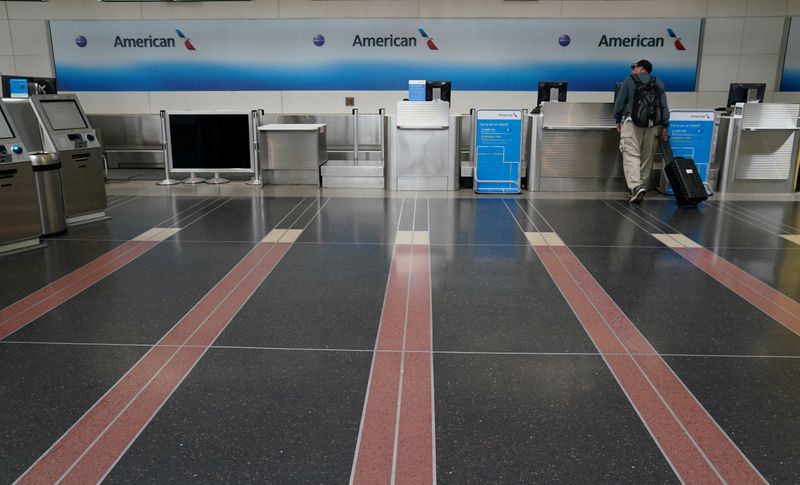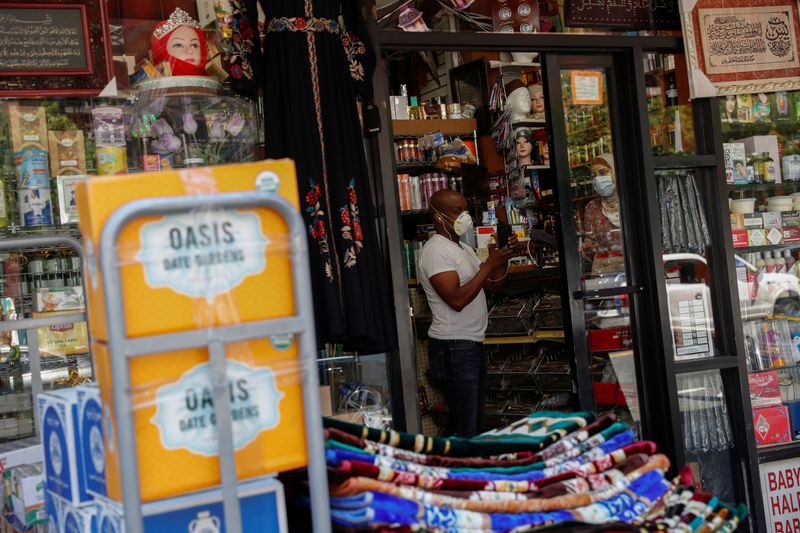By Lucia Mutikani
WASHINGTON (Reuters) - U.S. consumer prices rose moderately in January as higher gasoline prices were blunted by a slump in airline fares amid a relentless pandemic, tempering expectations for a sustained acceleration in inflation this year.
The report from the Labor Department on Wednesday also showed underlying consumer prices were unchanged for a second straight month. Inflation is under the spotlight, with economic growth expected to be juiced by fiscal stimulus and coronavirus vaccines becoming accessible to large swaths of the population, unleashing pent-up demand for services.
Higher inflation is anticipated by the spring as price declines early in the coronavirus crisis wash out of the calculations, but there is no consensus among economists on whether it would stick beyond the so-called base effects.
Federal Reserve Chair Jerome Powell said on Wednesday while he expected base effects and pent-up demand when the economy fully reopens to boost inflation, that was likely to be transitory, citing three decades of lower and stable prices.
"As the economy reopens we may see a burst of spending ... there could be some upward pressure on prices there, again though, my expectations would be that would be neither large nor sustained," Powell said at an Economic Club of New York event.
The consumer price index rose 0.3% last month after gaining 0.2% in December. In the 12 months through January the CPI increased 1.4% after climbing 1.3% in December. Last month's rise in the CPI was in line with economists' expectations.
Gasoline prices jumped 7.4% in January, accounting for most of the increase in the CPI, after rising 5.2% in December. Food prices gained 0.1%, but the cost of food consumed at home fell 0.1%. Prices for food consumed away from home climbed 0.3%.
Excluding the volatile food and energy components, the CPI was unchanged for a second consecutive month. The so-called core CPI was restrained by a 3.2% plunge in the cost of airline tickets. That offset increases in the prices of health care, motor vehicle insurance and tobacco. The core CPI rose 1.4% on a year-on-year basis, slowing from December's 1.6% advance.
The Fed tracks the core personal consumption expenditures (PCE) price index for its 2% inflation target, a flexible average. The U.S. central bank has signaled it would tolerate higher prices after inflation persistently undershot its target. The core PCE price index is at 1.5%.
Stocks on Wall Street were slightly higher. The dollar was steady against a basket of currencies. U.S. Treasury prices rose.
EYES ON SERVICES
The U.S. government provided nearly $900 billion in pandemic relief in late December. President Joe Biden has proposed a $1.9 trillion recovery package, which is winding its way through Congress. In addition to the fiscal stimulus, the Fed has slashed interest rates to near zero and is pumping money into the economy through bond purchases.
The Fed is expected to maintain its ultra-easy monetary policy stance until mid-2023. Some economists believe the combination of generous fiscal stimulus and very accommodative monetary policy will stoke inflation this year. The pandemic has also caused bottlenecks in the supply chain, leading to a surge in prices of raw materials and other inputs at factories.
A survey this month showed a measure of prices paid by manufacturers jumped to its highest level in nearly 10 years in January. Consumers are also anticipating higher inflation.
"Inflation is on its way thanks to fiscal and monetary stimulus and pent-up consumer demand that should intensify as the economy reopens," said Nancy Davis, founder of Quadratic Capital Management in Greenwich, Connecticut.
But other economists argue that labor market slack, characterized by at least 17.8 million people on unemployment benefits, would make it harder for inflation to become entrenched. They also believe the services sector, which has been fractured by the pandemic, will determine the path of inflation. Spending on services, which accounts for more than two-thirds of the U.S. economy, is 7.5% below the pre-pandemic level.
"Excess capacity in wide swathes of the economy, and low wage pressures from elevated unemployment will all keep inflation low over the next couple of years, especially for services, which make up more than one-half of consumer spending," said Gus Faucher, chief economist at PNC Financial (NYSE:PNC) in Pittsburgh, Pennsylvania. "Inflation will be stronger in a few areas with elevated demand, such as building materials and food purchased for home use."
In January, apparel prices increased 2.2%, rising for a third straight month. The cost of healthcare rose 0.4%, driven by a jump in prices for doctor visits. Consumers, however, paid less for prescription medication. Used cars and trucks, as well as new motor vehicles were cheaper.
Prices for household furnishings, communication and alcohol fell. Rents remained moderate.

Owners' equivalent rent of primary residence, which is what a homeowner would pay to rent or receive from renting a home, nudged up 0.1%, matching the rise in December. Many tenants have entered into forbearance agreements with landlords.
